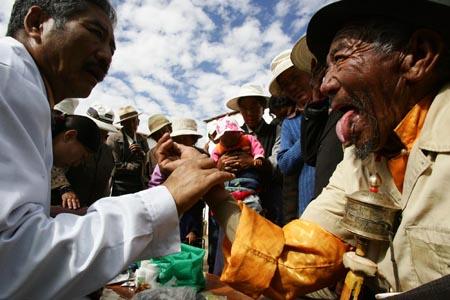
A Tibetan doctor examines a patient's tongue while taking his pulse.(Photo/CFP)
The Tibetan government plans to further promote traditional Tibetan medicine to people from different ethnic backgrounds around the country and even outside China. However, experts and industry insiders say authorities need to tackle a variety of challenges, including fake drugs.
The food and drug administration in Chifeng, the Inner Mongolia Autonomous Region, recently smashed a syndicate selling fake Tibetan drugs, qianlong.com reported November 10. Manufacturers had claimed one of the drugs could improve kidney function.
The packaging of the drugs indicated they had been produced by Tibetan medical institutions, but the administration said the manufacturers were unable to show legal production certificates.
On Tuesday, the food and drug administration in Qingshan district, Inner Mongolia, also found a local pharmacy selling three fake Tibetan drugs. The administration called on the public to report fake medicines to the authorities.
The Economic Information Daily, a newspaper run by the Xinhua News Agency, reported earlier, citing an industry insider, that the ratio of real and fake Tibetan drugs in the market is 1:10.
The report quoted a drug administration official in Xianyang, Shaanxi Province as saying more than 1,000 items of fake Tibetan drugs were smuggled into the city each day. The report said there were about 40 manufacturers of fake Tibetan drugs in Qinghai and Gansu provinces.
However, authorities across the country still want to promote traditional medicine. In Tibet, a government plan was issued last month aimed at spreading knowledge of traditional medicine to people in other parts of the country and even the world.
Under the plan, investment will be injected into local medicine companies, and help will be given to the Tibetan Traditional Medical College to build the world's largest Tibetan medicine sample and documentation center. The plan would also see Tibetan medical services included in health insurance plans.
The industry insider told the Economic Information Daily that many legitimate drug manufacturers are being severely affected by fake Tibetan drugs.
To many Tibetans, Tibetan medicine not only involves the use of herbs to cure illness, but also embodies a philosophy of human life.
Nimajiangcai, a Tibetan college lecturer in Yushu, Qinghai Province, began suffering from gastroenteritis in 2002. But he did not go to a general hospital for help. Instead, he paid 100 yuan ($15) to a Tibetan doctor, who prescribed him herbal medicine and asked him to pray everyday, which is considered part of "life behavior treatment."
After a year of treatment, the stomach pains went away. "Tibetan medicine is an essential part of Tibetan people's lives because it works so well, especially for chronic diseases," he said.
